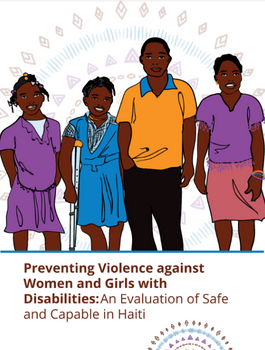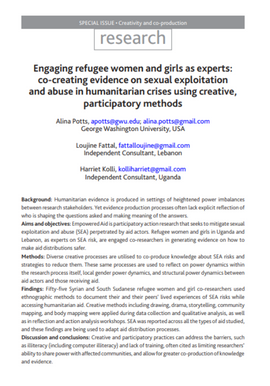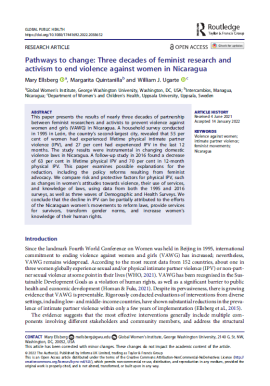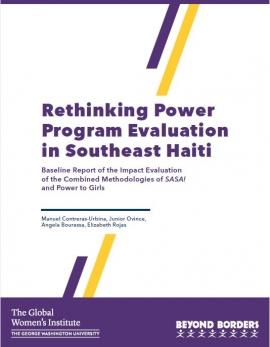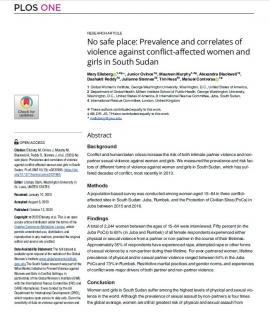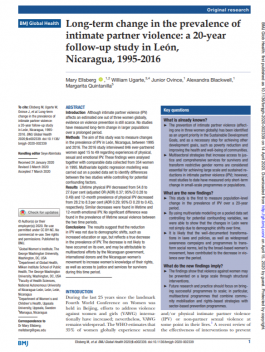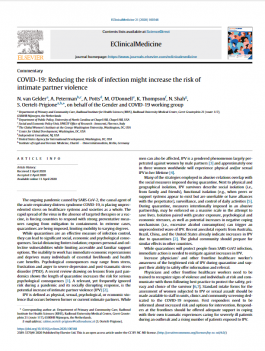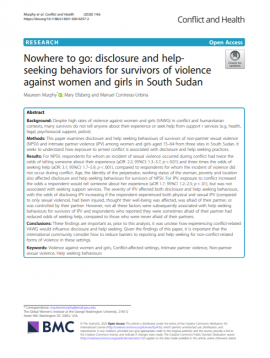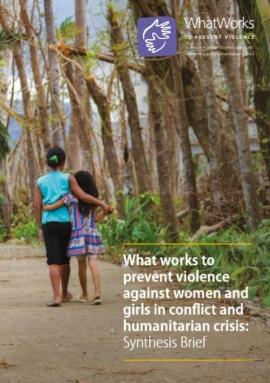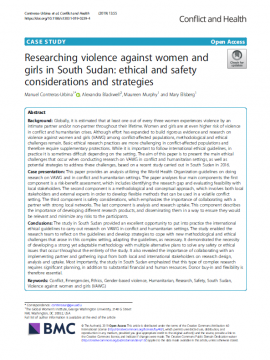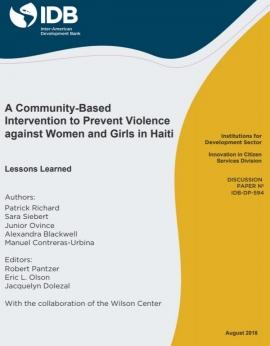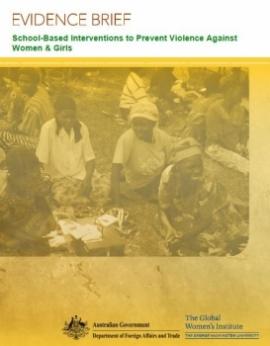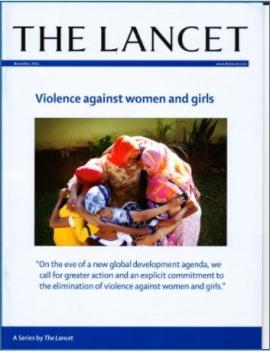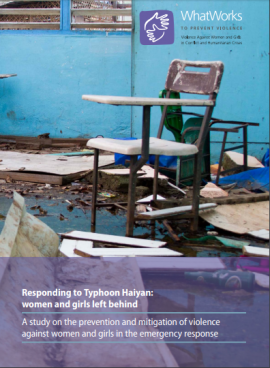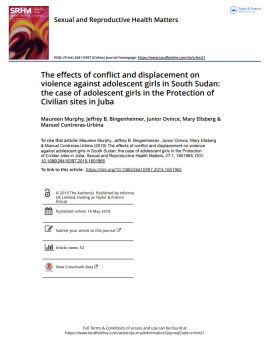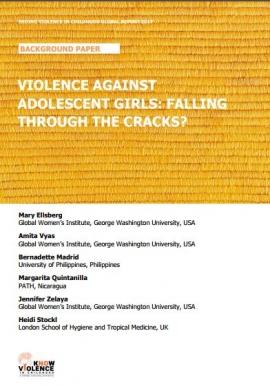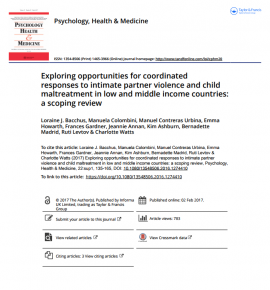Research Reports & Articles

Reducing Violence against Women and Girls in a Time of Crisis: An Impact Evaluation of the Rethinking Power Program in Haiti
This article discusses the findings of an evaluation led by GWI, on Beyond Borders' Rethinking Power program which was implemented in Southeast Haiti between 2017 and 2021. Rethinking Power is a multilevel, community-based intervention that aims to change attitudes and social norms around gender and violence, and ultimately reduce experiences of IPV. It utilizes the SASA! approach (created by Raising Voices) to mobilize community-based efforts to change knowledge, attitudes, and behaviors that perpetuate harmful gender norms. To complement the existing SASA! methodology, two new dimensions were developed and implemented by Beyond Borders to increase focus on populations experiencing intersecting oppressions. Power to Girls was introduced as an approach that focuses specifically on reducing violence against adolescent girls, and Safe and Capable is a resource pack that seeks to reduce stigma and violence against women and girls with disabilities. These three project components work together to mobilize communities to create an environment to support safety, non-violence, and the dignity of community members of all genders––particularly women and girls.

Interventions to Prevent Violence against Women and Girls Globally: A Global Systematic Review of Reviews to Update the RESPECT Women Framework
The aim of this systematic review of reviews is to update the evidence that underpins the RESPECT women framework with the newest available evidence from 2013 onward. The RESPECT women framework (UN Women, WHO) summarized successful approaches to preventing violence against women and girls across the seven different levels of the socioecological model.

Experience of Intimate Partner Violence and Non-Partner Sexual Violence in Conflict-Affected Settings: A Systematic Review and Meta-Analysis
This review aims to contribute to the understanding of violence against women and girls in conflict-affected and fragile settings through a systematic review and meta-analysis to document the available evidence on the prevalence of intimate partner violence and non-partner sexual violence during periods of armed conflict and in post-conflict periods. The results estimate that 39% of women and girls in conflict-affected settings have experienced physical or lifetime IPV, while 24% reported this violence in the past 12 months. For non-partner perpetrated violence, an estimated 21% of women and girls had experienced this violence in their lifetime and 11% reported having this experience during a period of conflict. When looking at sexual violence overall, an estimated 21% had experienced this violence, though there was considerable heterogeneity depending on the source of this data.
Co-creating accompanying systems to improve adolescent girls' and women's access to services
This article, lead authored by World Vision Jordan Project Officer Maha Al-Saudi and Empowered Aid Consultant Loujine Fattal, discusses how the Empowered Aid team worked with World Vision Jordan to consult refugee girls and women on the sexual abuse and exploitation (SEA) related risks they faced in Al Azraq camp when accessing aid services and centers. Alongside longer-term violence prevention and response programming incorporating their contextual knowledge, the women and girls co-designed and implemented accompanying systems which they indicated quickly enhanced their safety and access to services, while helping them feel more empowered and secure in navigating gender-unequal environments.
Empowered Aid is a participatory action research project led by the Global Women's Institute (GWI) in partnership with humanitarian aid actors. It aims to prevent SEA from occurring through models that actively reduce power disparities and give girls and women sustained voices in how aid is delivered.
Note: This article, "Co-creating accompanying systems to improve adolescent girls' and women's access to services," © 2024, by Maha Al-Saudi, Loujine Fattal, Mathilde Belli, Jessie Weber, and Alina Potts, is licensed under CC BY-NC-ND 4.0. The photo above was taken by Rand Ishaqat with the consent of the subjects and their guardians, and is not for reprinting.

Risk and Protective Factors for Violence Against Women and Girls Living in Conflict and Natural Disaster-Affected Settings: A Systematic Review
This systematic review provides an overview of existing research on risk and protective factors associated with violence against women and girls (VAWG) in conflict and natural disaster settings. The findings show that many preexisting risk factors for VAWG are exacerbated in armed conflict and natural disaster-affected settings. Poverty and economic stress, men’s substance abuse, exposure to violence, changing gender roles in contexts of inequitable gender norms, and a lack of social support are some of the risk factors associated with male perpetration or female experience of violence. In addition, risk factors specific to experiences during armed conflict or in a natural disaster (e.g., displacement, insecurity or congestion in and around displacement camps, militarization of society, killing of family, destruction of property, etc.) are associated with higher prevalence of VAWG in these contexts.
Preventing Violence against Women and Girls with Disabilities: An Evaluation of Safe and Capable in Haiti
This study has two aims: first, to assess rates and trends of VAWG with disabilities in the areas where the Rethinking Power program was being implemented in Haiti, and then to assess the impact of the Rethinking Power program (with the inclusion of the Safe and Capable component) to transform social norms around gender and disability and reduce VAWG with disabilities.
The Global Women’s Institute conducted a quasi-experimental impact evaluation of the Rethinking Power program, in partnership with Beyond Borders/Depase Fwontyè yo, Pentagone Consulting Group and Institut de Formation et de Services in Haiti. The evaluation used a mixed methods approach, combining both quantitative and qualitative methodologies to measure the impact of the program to transform unequal gender attitudes and reduce the rates of VAWG. Specifically, disability-disaggregated data was collected in 2019 (serving as baseline for this aspect of the evaluation) and in 2021 (endline). A previous round of data was collected in 2017 (the baseline for the wider Rethinking Power evaluation); however, disability-disaggregated data was not included at this point. Overall, the evaluation utilized both qualitative and quantitative methods to obtain a deeper understanding of VAWG and disability in the target communities, as well as to assess the effectiveness of the intervention among women with disabilities.
Shifting Power and Reducing Violence in Haiti: Initial Results of an Impact Study of SASA! and Power to Girls in Southeast Haiti
In 2016, with the support of the NoVo Foundation/Tides, American Jewish World Service, Imago Dei Fund, and individual donor support, Beyond Borders began implementing the Rethinking Power program encompassing both an adapted SASA! methodology and Power to Girls. The program aimed to reduce social acceptance of gender inequality and VAWG; decrease experiences and perpetrations of VAWG; increase girls’ sense of safety and freedom to make decisions; and decrease HIV and sexual and reproductive health (SRH) risk behaviors. In 2019, an additional, separately funded component, Safe and Capable, was added to address these areas among women and girls with disabilities. To measure the effectiveness of this approach, Beyond Borders and the Global Women’s Institute (GWI) at the George Washington University—with the support of the NoVo Foundation and the Inter-American Development Bank—undertook a quasi-experimental impact evaluation of the Rethinking Power program in Southeast Haiti.
This report presents the initial findings of the evaluation results that demonstrate the effectiveness of the Rethinking Power approach. We utilize both quantitative and qualitative data from intervention and comparison sites to explore the effectiveness of the program. The findings of this report are meant for non-governmental, government and policy stakeholders to understand the changes among key indicators related to VAWG documented by the study team. Further statistical analysis is also being undertaken and will be shared in upcoming peer-reviewed articles.
Survivor-Centred Justice for Gender-Based Violence in Complex Situations
This report is the result of new research conducted by IDLO, in partnership with the Global Women’s Institute at George Washington University, in six countries across the globe with the aim to identify approaches that centre survivors in all efforts to address gender-based violence (GBV) in complex situations.
The report is informed by country case studies in Afghanistan, Honduras, Papua New Guinea, the Philippines, South Sudan, and Tunisia, to provide different perspectives of complexity in accessing justice and an analysis of diverse justice mechanisms dealing with GBV in situations of conflict, organized crime, climate disasters, and health emergencies, often intersecting with contexts of legal pluralism and political transition.
Whose voices matter? Using participatory, feminist and anthropological approaches to centre power and positionality in research on gender-based violence in emergencies
An expansive view of ‘rigorous’ research is needed, particularly when studying complex health and human rights issues in settings where the imbalance of power between research participants, users and producers is heightened. This article examines how applying participatory, feminist and anthropological methods in gender-based violence research can hold researchers accountable to both acknowledging and explicitly addressing these power disparities.
Blog Post: Engaging refugee women and girls as safeguarding experts, using creative and participatory methods
This blog post is based on the Evidence & Policy article, ‘Engaging refugee women and girls as experts: co-creating evidence on sexual exploitation and abuse in humanitarian crises using creative, participatory methods’, part of the Special Issue on Creativity and Co-production.
Engaging refugee women and girls as experts: co-creating evidence on sexual exploitation and abuse in humanitarian crises using creative, participatory methods
Humanitarian evidence is produced in settings of heightened power imbalances between research stakeholders. Yet evidence production processes often lack explicit reflection of who is shaping the questions asked and making meaning of the answers. This paper highlights our Empowered Aid program, which is participatory action research that seeks to mitigate sexual exploitation and abuse (SEA) perpetrated by aid actors. Refugee women and girls in Uganda and Lebanon, as experts on SEA risk, are engaged co-researchers in generating evidence on how to make aid distributions safer.
Pathways to change: Three decades of feminist research and activism to end violence against women in Nicaragua
This paper presents the results of nearly three decades of partnership between feminist researchers and activists to prevent violence against women and girls (VAWG) in Nicaragua. A household survey conducted in 1995 in León, the country’s second-largest city, revealed that 55 per cent of women had experienced lifetime physical intimate partner violence (IPV), and 27 per cent had experienced IPV in the last 12 months. The study results were instrumental in changing domestic violence laws in Nicaragua. A follow-up study in 2016 found a decrease of 63 per cent in lifetime physical IPV and 70 per cent in 12-month physical IPV. This paper examines possible explanations for the reduction, including the policy reforms resulting from feminist advocacy.
THE "SORROW REMAINS INSIDE": Applying A Mixed Methods Approach to Understand the Relationship between Gender-Based Violence and Mental Health, Coping and Service Seeking among Lebanese and Syrian Refugee Women in Lebanon.
Lebanese organization ABAAD, in coordination with the Global Women’s Institute, released their new 2020 Narrative Report, developed in part of GWI’s work to build the capacity of local organizations to conduct research on gender-based violence. This report addresses mental health among adult women survivors of gender-based violence in Lebanon in order to increase awareness among the affected population as well as educate healthcare providers about this intersection so that women and girls have greater access to quality services.
“If You Are Born a Girl in This Crisis, You Are Born a Problem”: Patterns and Drivers of Violence Against Women and Girls in Conflict-Affected South Sudan
This article presents the results of a qualitative study on the context and different forms of violence committed against women and girls in South Sudan. The study documents many forms of sexual and physical violence against women and girls in South Sudan, including conflict-related sexual violence, intimate partner violence, nonpartner sexual violence, child and forced marriage, and abduction. Violence occurred during three overarching contexts: armed conflict, gender inequality, and the economic crisis. The custom of bride price, combined with the economic crisis, is a key driver of many other forms of violence.
GBV and mental health among refugee and host community women in Lebanon
GWI in partnership with Abaad, a Lebanese organisation working on all aspects of GBV prevention and response, conducted a service-based study to understand gender-based violence (GBV) and mental health experiences and needs among Lebanese women and girls, in both refugee and host communities. In this piece for Forced Migration Review, they share key aspects of this action-oriented research and reflect on the value of researcher-practitioner collaborations, as well as provide recommendations for humanitarian actors to better collaborate in providing support to survivors with mental health needs.
Gap Analysis of Gender-Based Violence in Humanitarian Settings: a Global Consultation
This Gap Analysis by Elrha and the Global Women’s Institute provides a systematic and comprehensive global assessment of gender-based violence (GBV) in humanitarian emergencies within the framework of GBV risk mitigation, response, and prevention.
This report provides an overview of the key gaps and needs across GBV risk mitigation, response and prevention to improve humanitarian outcomes for women and girls affected by GBV.
Rethinking Power Program Evaluation in Southeast Haiti
This report is the baseline results of the Rethinking Power program, an adaptation of the SASA! and PowertoGirls methodologies. The robust quantitative and qualitative data obtained through the baseline provide an in-depth diagnosis of the situation of different types of VAWG in Southeast Haiti. This quasi-experimental impact evaluation of the Rethinking Power program is carried out by GWI and Beyond Borders with the support of the NoVo Foundation and the Inter-American Development Bank. Published on February 2021.
You can also read the report in French here.
No Safe Place: Prevalence and correlates of violence against conflict-affected women and girls in South Sudan
This paper is an in-depth analysis of the data from the What Works initiative study on VAWG in South Sudan. The study found that women and girls in South Sudan suffer among the highest levels of physical and sexual violence in the world. Although the prevalence of sexual assault by non-partners is four times the global average, women are still at greatest risk of physical and sexual assault from intimate partners. Conflict-related and intimate partner violence reinforce each other and are upheld by restrictive gender norms and marital practices. The study concluded that expansion of comprehensive services, including health and psycho-social support for survivors is urgently needed. Moreover, policies and laws to prevent violence against women and provide survivors with access to justice should be given high priority within the ongoing peacebuilding process in South Sudan.
Pandemics and Violence Against Women and Children
This paper, co-authored by GWI Research Scientist Alina Potts, evaluates the key pathway between pandemics and violence against women and children (VAW/C) with the goal of informing further evidence generation and policy action while situating VAW/C within the broader need for intersectional gender- and feminist-informed pandemic response.
Long-term change in the prevalence of intimate partner violence: a 20-year follow-up study in Leon, Nicaragua, 1995-2016
Co-authored by GWI Director Dr. Mary Ellsberg, this article shares the results of GWI's follow up study on intimate partner violence (IPV) in León, Nicaragua, 20 years after the initial prevalence study, which was also led by Dr. Ellsberg. This study is the first to measure population-level change in the prevalence of IPV over a 20-year period.
The results suggest that the reduction in IPV was not due to demographic shifts, such as increased education or age, but reflects a true decrease in the prevalence of IPV. The decrease is not likely to have occurred on its own, and may be attributable to multisectoral investments in services, justice and social norms change. The article recognizes the women's movement in Nicaragua as a driving force for this historic achievement.
COVID-19: Reducing the risk of infection might increase the risk of intimate partner violence
Co-authored by GWI Research Scientist Alina Potts, this commentary discusses the COVID-19 quarantine and the immediate action needed to mitigate increases in IPV.
Nowhere to go: disclosure and help-seeking behaviors for survivors of violence against women and girls in South Sudan
This paper examines disclosure and help seeking behaviors of survivors of non-partner sexual violence (NPSV) and intimate partner violence (IPV) among women and girls aged 15–64 from three sites in South Sudan. It seeks to understand how exposure to armed conflict is associated with disclosure and help seeking practices.
Ending Violence against women and girls: Evaluating a decade of Australia’s development assistance
The Office of Development Effectiveness (ODE) commissioned this evaluation of Australia's development assistance for EVAWG to assess the progress made since the 2008 ODE evaluation, Violence Against Women in Melanesia and East Timor: Building on Global and Regional Promising Approaches, and conducted by the Global Women’s Institute (GWI) at the George Washington University and the Equality Institute through Coffey International Development.
The evaluation found that Australia has provided strong and sustained leadership on EVAWG and been a leading donor. Overall the approaches used have aligned with best practice and made a significant contribution to EVAWG in the Indo-Pacific. The evaluation found that while progress has been made Australian leadership and long-term investments including those with local women's organizations remain critical. The report includes recommendations to guide Australia's policy engagement and aid investments on EVAWG over the next decade.
The evaluation is also accompanied by a brief, literature review and guidance papers.
What works to prevent violence against women and girls in conflict and humanitarian crisis: Synthesis Brief
Violence against women and girls (VAWG) is an important human rights concern and a pervasive issue affecting women and girls during times of conflict and humanitarian crisis. Over the last five years, the What Works to Prevent Violence Against Women and Girls research programme, funded by UK Aid, has been conducting research to expand the international community’s knowledge around VAWG and the effectiveness of programmes that seek to prevent and respond to this violence. This new brief synthesises the key results of What Works studies as well as other findings from contemporaneous research efforts published since 2015. It aims to provide an up-to-date resource for practitioners, policymakers and researchers on the state of evidence on VAWG in conflict and humanitarian settings and makes recommendations for VAWG policy, programming, and future research priorities.
Researching violence against women and girls in South Sudan: ethical and safety considerations and strategies
The aim of this paper is to present the main ethical challenges that occur when conducting research on VAWG in conflict and humanitarian settings, as well as potential strategies to address these challenges, based on a recent study carried out in South Sudan in 2016. This paper provides an analysis utilizing the World Health Organization guidelines on doing research on VAWG and in conflict and humanitarian settings.
Violence against Adolescent Girls: Trends and lessons for East Africa (Full Report)
This research study examines the unique experience of adolescent girls by specifically exploring the types of gender-based violence and the drivers of this violence affecting this group within the context of South Sudan, where women and girls experience high levels of gender inequality and subordination. Key findings from this mixed-methods research can inform policymakers, UN agencies and donors as they identify and support programs that will effectively prevent and respond to violence against adolescent girls in conflict and humanitarian settings. Read the policy brief.
Intersections of violence against women and girls with state-building and peace-building: Lessons from Nepal, Sierra Leone and South Sudan (Full Report)
As part of the What Works to Prevent Violence Against Women and Girls program, funded by the UK Department for International Development, this study draw on three case countries – Nepal, Sierra Leone and South Sudan – to address gaps in evidence and understanding on violence against women and girls during post-conflict transition. In doing so, the study aims to increase recognition of the potential for state-building and peace-building processes to more effectively institutionalize approaches to violence against women and girls, and the role that addressing such violence can play in advancing sustainable peace.
No Safe Place: A lifetime of violence for conflict-affected women and girls (Full Report)
As part of the What Works to Prevent Violence Against Women and Girls program, funded by the UK Department for International Development, this project is the first of its kind to capture population-based prevalence data on violence against women and girls in a conflict setting. The findings from this groundbreaking study will be used to inform international policy and priorities. Read the policy brief.
Dataset from No Safe Place
The dataset from the No Safe Place study is available upon request. Both the men's and women's dataset are available as .csv files. Please complete the access request form detailing your information, reason for your request and other relevant details. Requests are usually processed within 2-3 business days.
No Safe Place: A lifetime of violence for conflict-affected women and girls (Summary Report)
As part of the What Works to Prevent Violence Against Women and Girls program, funded by the UK Department for International Development, this project is the first of its kind to capture population-based prevalence data on violence against women and girls in a conflict setting. The findings from this groundbreaking study will be used to inform international policy and priorities. Read the policy brief.
Evidence Brief: What works to prevent and respond to violence against women and girls in conflict and humanitarian settings
A Community-Based Intervention to Prevent Violence against Women and Girls in Haiti
The purpose of this report is to document the lessons learned from a review of the planning, implementation, and evaluation of the SASA! program by Raising Voices and the Beyond Borders’ program, Power to Girls, both of which took place in Haiti. Findings from this analysis will contribute to the broader literature on adapting, testing, implementing, and evaluating evidence-based interventions in developing countries.
Education Policy Brief: School-based interventions to prevent violence against women and girls
The objective of this brief is to provide a concise overview of select school-based interventions that aim to prevent VAWG or improve knowledge and attitudes that perpetuate VAWG.
Preventing Violence Against Women and Girls: What does the evidence say?
GWI carried out a groundbreaking and comprehensive review of evidence-based interventions to prevent VAWG that are now being implemented around the world. GWI’s research identified several promising programs that measurably reduce violence.
The Lancet, a premier international medical journal, published the findings in a special issue on violence against women and girls. Effective prevention models were found to have common elements: most engaged both women and men, addressed underlying gender inequalities, involved community mobilization, and transformed social norms.
The editors of The Lancet also produced a call to action in the issue, providing government leaders with specific policy recommendations for violence prevention.
Building an evidence base: Global review of evidence about how to end violence against women (Review of reviews)
In partnership with the World Bank, GWI carried out a comprehensive global review of the evidence base on effective interventions to prevent VAWG. The goal of the review was to broaden understanding on what works to reduce different forms of VAWG, including intimate-partner violence, child sexual abuse, child and forced marriage and rape.
GWI conducted a systematic review of reviews that included 58 systematic and comprehensive reviews and over 300 individual impact evaluations. It was published as part of the World Bank’s Voice and Agency Research Series, 2014.
Responding to Typhoon Haiyan: women and girls left behind
As part of the What Works to Prevent Violence Against Women and Girls program, this study in partnership with the International Rescue Committee, examines how VAWG prevention and mitigation were carried out in the early phases of the emergency response to Typhoon Haiyan in the Philippines. The findings from this study provide further lessons on the challenges of addressing VAWG in emergencies.
The effects of conflict and displacement on violence against adolescent girls in South Sudan: the case of adolescent girls in the Protection of Civilian sites in Juba
Based on secondary analysis of a larger study on VAWG in South Sudan, this article highlights the specific experience of conflict-affected adolescent girls resident in the Juba Protection of Civilian sites. Quantitative data from a cross-sectional household survey shows that the prevalence of non-partner sexual violence (NPSV) (26.5%) and intimate partner violence (IPV) (43.1% of partnered respondents) was high among a cohort of girls who were of adolescent age during the 2013 crisis.
Exploring the Intersection of Violence Against Women and Girls With Post-Conflict Statebuilding and Peacebuilding Processes: A New Analytical Framework
This article makes three major contributions to guide researchers and policymakers in addressing VAWG in post-conflict contexts. First, it identifies critical gaps in understanding the intersection between VAWG and post-conflict statebuilding and peacebuilding processes. Second, it presents an ecological model to explore the drivers of VAWG during and after armed conflict. Third, it proposes a conceptual framework for analysing and addressing the intersections of VAWG with both post-conflict statebuilding and peacebuilding. The article concludes that application of this framework can help policymakers shape statebuilding and peacebuilding processes to more effectively institutionalise approaches to VAWG so that post-conflict transitions advance sustainable, positive peace.
Violence Against Adolescent Girls: Falling through the cracks?
This paper explores how and why current conceptual frameworks and evidence fail to address the specific conditions of adolescent girls and their vulnerability to violence as well as examine opportunities for strengthening policies and programs for responding to and preventing violence against adolescent girls.
Exploring opportunities for coordinated responses to intimate partner violence and child maltreatment in low and middle income countries: a scoping review
Intimate partner violence (IPV) and child maltreatment (CM) by a parent or caregiver are prevalent and overlapping issues with damaging consequences for those affected. This scoping review aimed to identify opportunities for greater coordination between IPV and CM programmes in low- and middle-income countries (LMIC).



